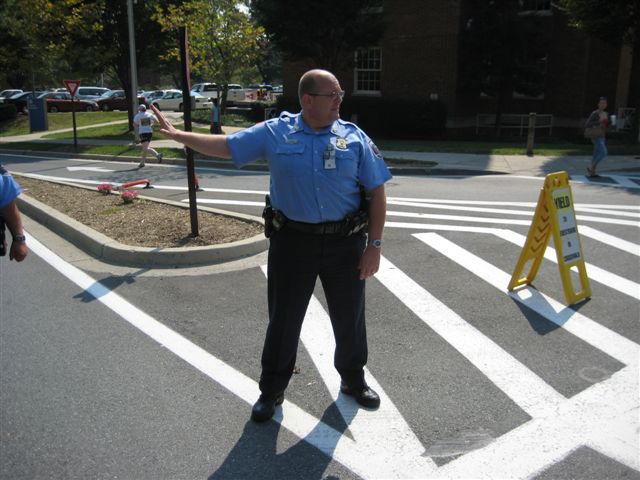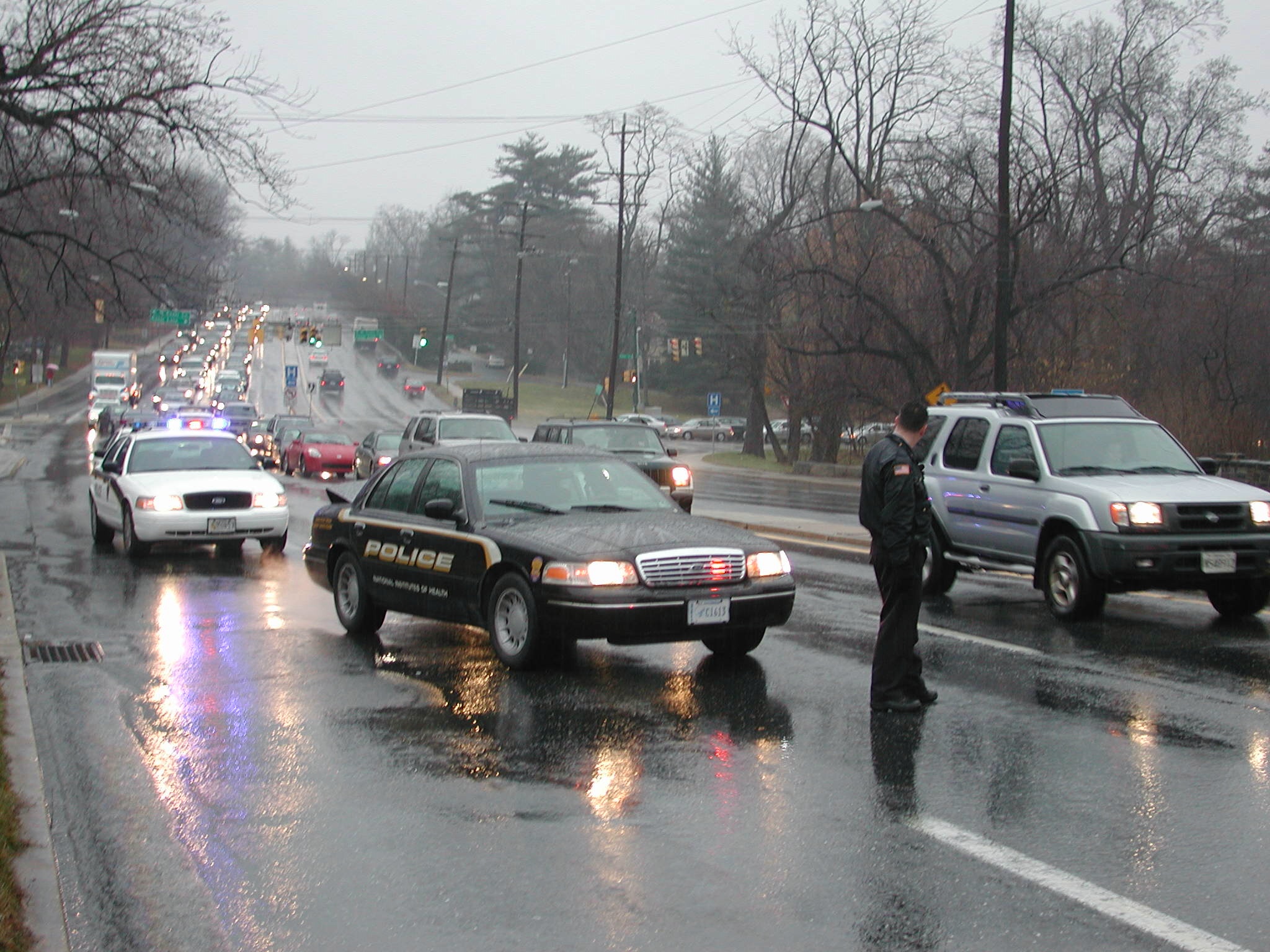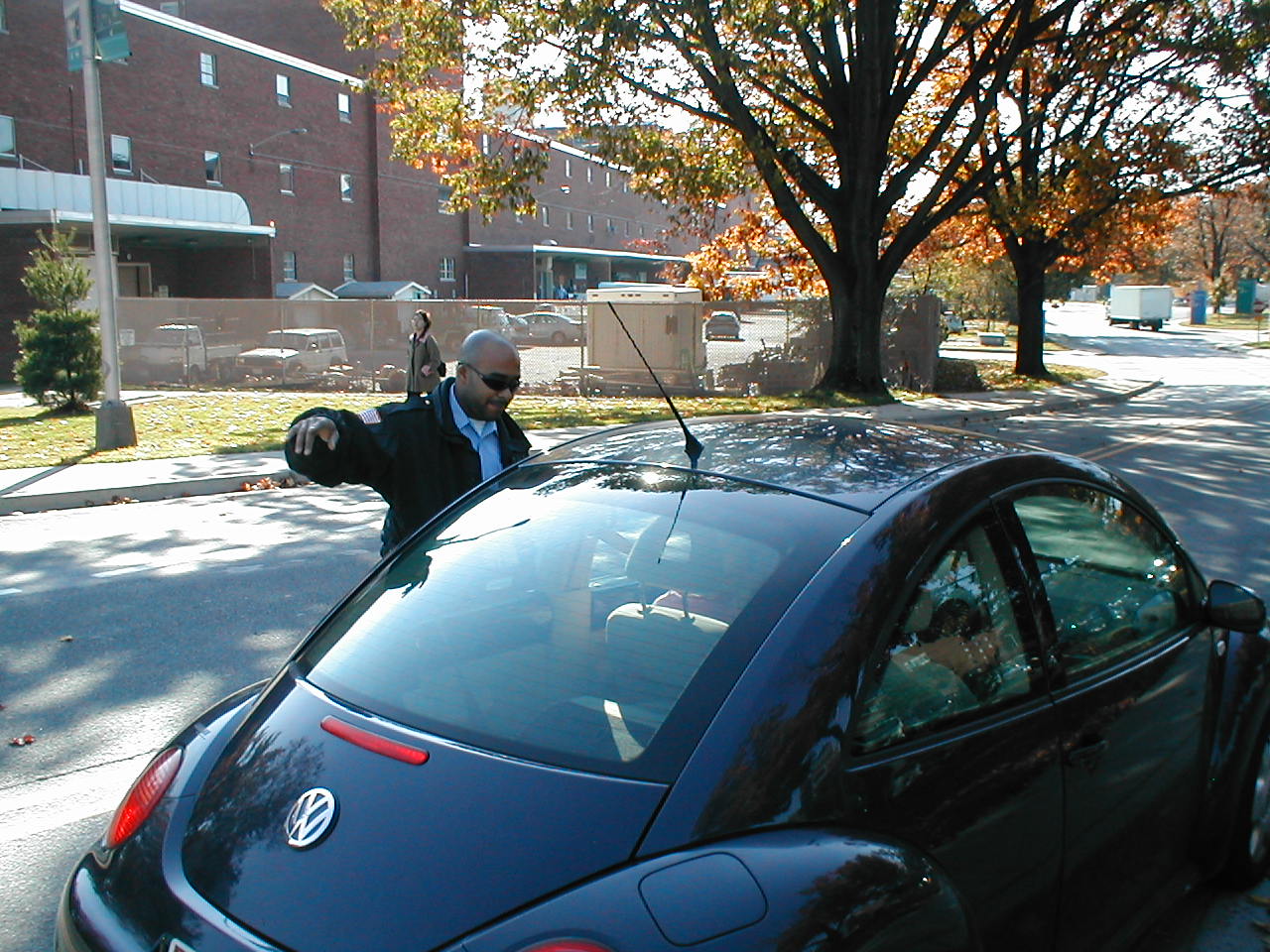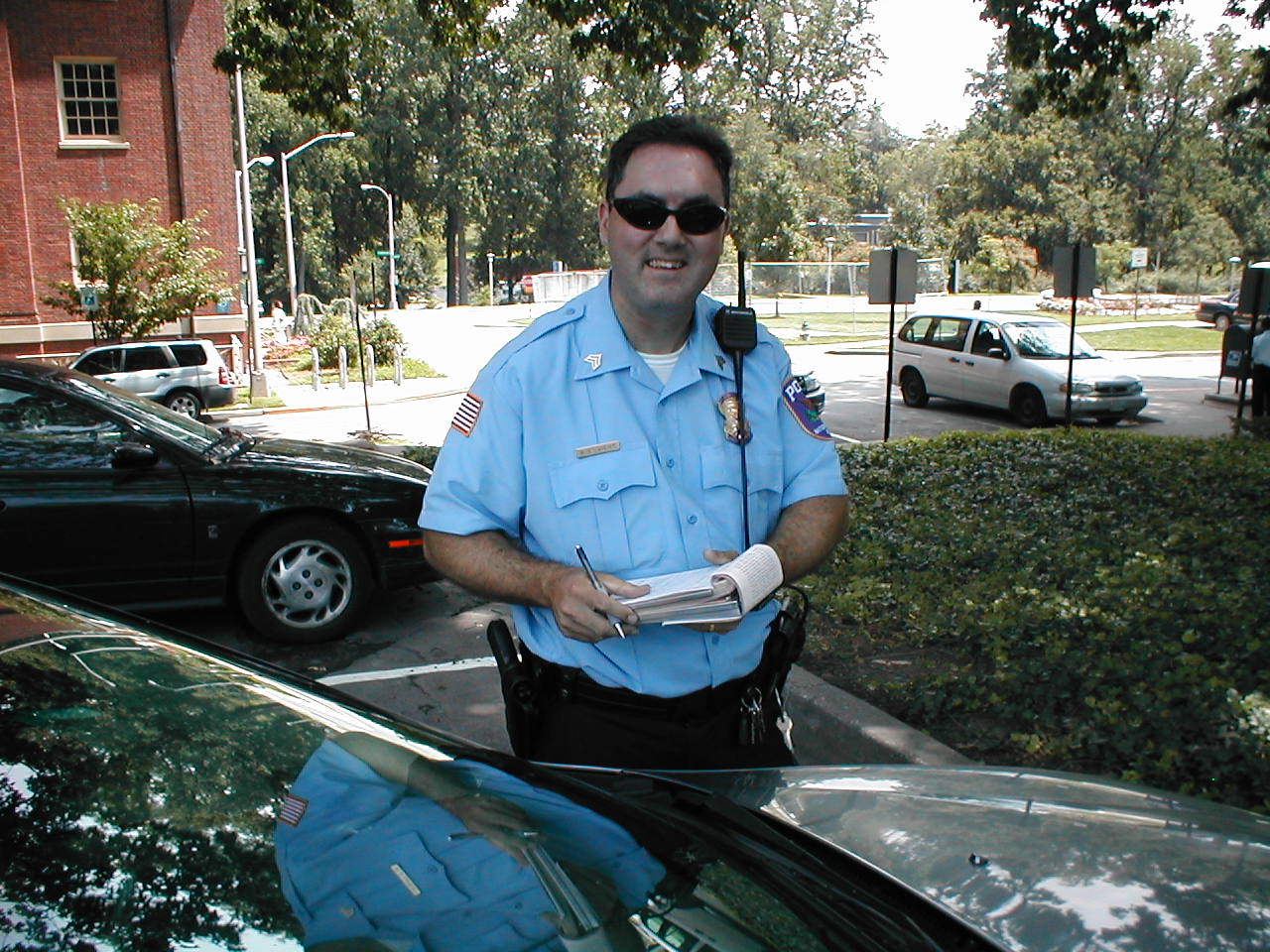Traffic Control and Enforcement
Traffic control and enforcement of various traffic and parking regulations forms an important part of the patrol officer’s function at the National Institutes of Health (NIH).  Officers are tasked with ensuring the safe movement of pedestrians, vehicles, and bicycles on the NIH campus. To allow for the safe movement of traffic on the NIH campus, officers take appropriate enforcement action to help keep the NIH community in compliance with appropriate traffic laws. Officers also enforce a wide variety of parking regulations, which are needed to ensure that available parking on the NIH campus is kept under control. Parking enforcement assists with regulating each of the different parking areas (i.e. red, carpool, general, etc.), helping keep parking available for permit holders of each of the different type of parking permits issued by the parking office.
Officers are tasked with ensuring the safe movement of pedestrians, vehicles, and bicycles on the NIH campus. To allow for the safe movement of traffic on the NIH campus, officers take appropriate enforcement action to help keep the NIH community in compliance with appropriate traffic laws. Officers also enforce a wide variety of parking regulations, which are needed to ensure that available parking on the NIH campus is kept under control. Parking enforcement assists with regulating each of the different parking areas (i.e. red, carpool, general, etc.), helping keep parking available for permit holders of each of the different type of parking permits issued by the parking office.
Traffic Control
Officers are often called upon to help control pedestrian and vehicular traffic during peak traffic times, during special events, or at accident scenes. When oversize deliveries arrive at the campus, officers may need to escort these deliveries through the campus to allow the safe passage of these items (i.e., large air conditioning units, prefabricated concrete building materials, etc.) to their destination. As the NIH improves the campus through the renovation of existing buildings or the construction of additions to them, officers will often assist with  the safe and efficient flow of traffic around these construction sites. During special events, such as the visit of the President of the United States to the NIH campus, officers control pedestrian and vehicular traffic along the travel route, and will escort the motorcade while it is on the NIH campus. Officers work in conjunction with other Federal, State, and local police agencies during these events. Officers also assist with traffic control during other major annual events, such as the NIH Institute Relay Race.
the safe and efficient flow of traffic around these construction sites. During special events, such as the visit of the President of the United States to the NIH campus, officers control pedestrian and vehicular traffic along the travel route, and will escort the motorcade while it is on the NIH campus. Officers work in conjunction with other Federal, State, and local police agencies during these events. Officers also assist with traffic control during other major annual events, such as the NIH Institute Relay Race.
Traffic Enforcement
To ensure the safety of NIH employees, contractors, and the visiting public, officers are authorized to enforce traffic laws and regulations on NIH property. Officers receive training at the Federal Law Enforcement Training Center (FLETC) as well as additional on-the-job training in conducting traffic enforcement. Officers enforce traffic laws through one of two primary sources: regulations listed under the Code of Federal Regulations (45 CFR) and the Maryland Transportation Article. The question often arises, “why are officers enforcing Maryland laws on Federal property?” The main reason officers issue citations for moving violations using the Maryland Transportation Article is that the Code of Federal Regulations does not have a separate charge for many of the violations listed under the Maryland Article. 
Most of the regulations listed under 45 CFR pertain to parking enforcement rather than moving violations. The authority to assimilate the laws of the surrounding state in which the NIH campus is located comes from the Assimilative Crimes Act (18 USC 13). Simply put, if there is not an existing Federal regulation for a particular violation, officers at NIH are allowed to use the state equivalent. In any case, there are literally thousands of pedestrians and vehicles moving around the campus each day, making traffic enforcement a vital part of ensuring the safety of everyone at NIH. Individuals who encounter an officer (or officers) during a traffic enforcement situation should remain calm, polite, and should provide all necessary information to the officer (or officers) as requested. Compliance with NIH Police officers during what can be a stressful situation for a driver is greatly appreciated and will often expedite the process for all involved. Safety is the number one concern.
Parking Enforcement
Although parking enforcement at the NIH campus can be a sensitive issue to some, it is an important part of the duties of the NIH Police to enforce parking regulations. There are dozens of different parking areas involving a variety of different types of parking permits that are permitted for use in these areas. There are also numerous fire lanes and other restricted areas where parking is completely prohibited at all times that need to be kept clear. This allows the NIH Fire Department to access buildings quickly and efficiently when responding to emergency calls, or allows other traffic to safely move through an area without the 
impediment of unauthorized vehicles causing unlawful interference to traffic flow.
Enforcement often includes checking areas that are assigned for use by specific categories of parking permit holders, such as carpool permits, red permits, P-2 patient care permits, designated handicapped parking spaces, etc. In order to maintain the ability of these special categories of permit holders to access the parking areas that they are authorized to use, parking enforcement is conducted to deter the unlawful parking by others who do not have the specific permit authorized for use in these areas. The officers of the NIH Division of Police face a daunting task of improving the efficiency of parking through the appropriate use of parking enforcement, due to the sheer number of vehicles on campus every day. Should you receive a parking citation, there are two options, as set forth by the written notice from the Chief of Police (copies of this notice are available at the NIH Division of Police main desk at Bldg. 31C, Rm. B3-B17):
As a matter of law, all traffic citations issued by the NIH Police “are accountable to the U. S. District court, irrespective of the charge, circumstances involved, or the location of the offense on the campus. Persons issued traffic tickets for moving or parking violations have the following recourse:
· Pay the collateral per the instructions on the ticket, or
· Appear in court and stand trial should the ticket require a mandatory appearance, or
· Stand trial on the date and time and at the court specified provided by notice through the mail by the Central Violations Bureau.”
For additional information regarding Traffic Control and Enforcement, contact Sergeant LaHeist at 301-496-2387.